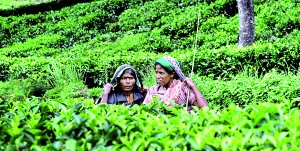Recent Govt. decisions lead to ‘progressive decimation of the tea industry’ : CTTA
View(s):Sri Lanka’s tea sector has warned that recent state decisions, without consultation with the sector, has triggered a progressive decline of this vital industry
In a statement, the Colombo Tea Traders’ Association (CTTA) said:
“It was a little over two years ago that, coinciding with the Budget Proposals for 2011, at midnight on November 22/23, 2010, an enhancement of the tea cess levy on exports of tea in bulk, in packaging in excess of 10 kgs, was imposed on the tea industry of the country, from Rs.4 per kg to Rs.10 per kg, amounting to an increase of 150 per cent. This was compounded by the imposition, earlier that month, by the Sri Lanka Tea Board of what was described as a Promotion and Marketing Levy of Rs.3.50 per kg.
Now, like a bolt from the blue, the industry has just learnt that, retroactively, with effect from January 23, 2013, the export cess on tea in bulk has been enhanced by a further approximately 100 per cent. This has been implemented without consultation with the line Ministry, the regulatory authority of the tea industry and the apex body of the industry, the CTTA, where all were kept in the dark with regard to this decision.
The total absence of advance notice of this fiscal levy will have serious repercussions on the export trade, the industry at large and the country. Exporters will be affected to various degrees, depending on the stage at which export commitments are currently placed, as elucidated below.
Contracts against which consignments are packed and ready for shipment would have no provision for this increase in contractual prices and exporters will have to absorb the entire burden, which will result in significant losses.
Likewise, contracts against which teas have already been purchased but not processed would also have no provision for this increase made in contractual prices. Consequently, with teas already purchased at higher limits for allocation to these export consignments, exporters will, once again, incur substantial losses, with no option but to absorb this additional charge

File pic of tea workers.
In the above two scenarios, to recover the losses sustained, Buyers will be compelled to adjust their future price limits to an extent far in excess of Rs.10 per kg, in respect of contracts concluded on January 23, 2013, and thereafter. In turn, this will affect auction prices and impact producers’ sales proceeds more than anticipated. The resultant lower net sale averages will impact on green leaf prices payable to smallholders.
Contracts concluded prior to January 23, 2013, against which teas have still to be purchased, would have made no provision for this increase, and price limits to service these contracts would have to be reduced correspondingly, resulting immediately in lower auction prices, with relevant ramifications. This was already evident at the auction held this week, as news of this increased levy belatedly permeated the trade. Here, too, producers will not be unscathed, as this will result in a reduction in the sales proceeds receivable by them and smallholders, in turn, will receive lower returns on their green leaf.
Any attempts at re-negotiation of contractual commitments, with a view to passing on the increased levy to overseas buyers, would be futile and will only serve to antagonize them and jeopardize future relationships.
Some producers, in an effort to ensure some degree of sustainability, due to the volatile market conditions experienced over the past months, had committed much of their production to forward contracts and would now have to absorb this enhanced cess levy, negating the benefits of this safety net that they anticipated.
With wide swings in weather patterns, from excessive rains and floods to blistering droughts, production volumes have been adversely affected, leading to escalation in the cost of production.
For months, the sanctions placed on trade with Iran and the chaos in Syria, have been inhibiting tea businesses with those two large markets for Ceylon Tea. It is, therefore, inexplicable that the Government should, in this manner, add to the woes of the tea industry at this critical point.
The CTTA has constantly expressed concern that the funds so collected are not being put to the best use, in the context of the needs and the benefit of the industry, and have long been agitating that, as the apex body of the industry, it should be consulted prior to the adoption/implementation of enhancements in such levies, not the least of which being the proper allocation and disbursement of the considerable funds that are collected each year.
This has been seriously violated by a decision taken by Parliament to consolidate at the Treasury all cess funds collected on exports of tea, which provides for their disbursement in accordance with priorities to be determined by this State Fiscal Authority, instead of being utilized exclusively for the benefit of the industry. This could mean that the industry may not necessarily be the beneficiary, in any form, of funds that have been speciously extracted from its stakeholders, which, originally, were directly assigned to and regulated by the line Ministry. These are all contributing to the progressive demise of this once great industry.
Follow @timesonlinelk
comments powered by Disqus

















